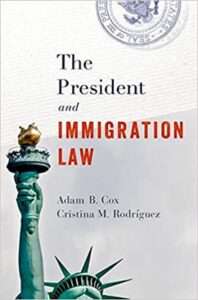Adam Cox and Cristina Rodriguez Respond to Critics and Commentators on their Book "The President and Immigration Law"
This is the conclusion of the Yale Journal on Regulation symposium about the book.

The Yale Journal on Regulation online symposium on Adam Cox and Cristina Rodriguez's important new book, The President and Immigration Law, has now concluded with the authors' response to the commentators and critics.
All of the contributions can be accessed here. My own essay praises the book and accepts much of the author's analysis of the growth of executive power over immigration and its dangers. But, in assessing possible solutions for the problems they identify, I argue that the authors undervalue the importance of strengthening constitutional constraints on executive power, and making it easier for migrants to enter the United States legally.
In their thoughtful response, Cox and Rodriguez partly agree with my suggestions, but emphasize that neither the full elimination of constitutional double standards on immigration policy nor the adoption of a presumption of freedom of movement across national borders are likely to be fully realized, anytime soon, if ever.
I agree these ideals are unlikely to be fully realized anytime soon, and said as much in my initial contribution. But I also pointed out that there is a great deal of room for incremental progress on both fronts. Cox and Rodriguez's own reform proposal of legalizing most of the current undocumented immigrant population and severely curbing detention and deportation is also unlikely to be fully implemented in the near future. For reasons noted in my contribution, strengthening judicial review and cutting back barriers to legal migration are essential components of any reform agenda, whether incremental or radical.
Indeed, failure to pursue the the former might even undercut many of the beneficial effects of the latter. If detention and deportation are more tightly constrained, a White House hostile to immigration would have incentives to double down on using its discretionary authority to try to keep out migrants in the first place. If so, there may be little net reduction in executive power in this field and its undermining of the rule of law. For potential migrants, being barred to begin with can be just as bad or (in some cases) even worse than being deported after entry.
I previously also commented on Prof. Dan Farber's outstanding contribution to the symposium, which focuses on the ways in which the current executive-dominated immigration regime undermines the rule of law.
In conclusion, I once again commend the authors on their outstanding book. The debate over these issues will surely continue.
